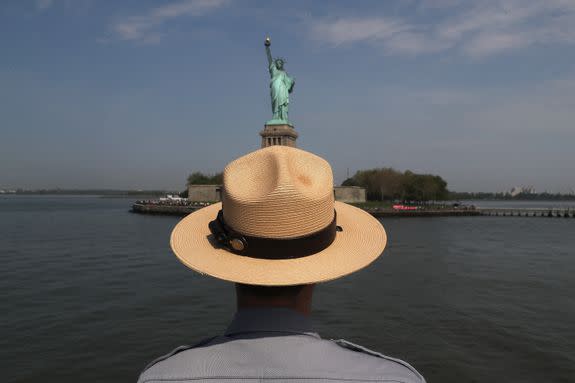Park Service to raise fees in 117 parks, but that still won't solve its looming problem

The National Park Service decided Thursday that it will raise fees at 117 national park sites, but the increases are quite modest compared to the previous proposal.
Facing a more than $11 billion backlog in the upkeep of national parks, Interior Secretary Ryan Zinke previously proposed raising fees to $70 in 17 of the most popular parks like Yellowstone, Yosemite, and the Grand Canyon.
The government allowed the public to weigh in on the fee increases, and the responses showed overwhelming opposition to the dramatic increase.
SEE ALSO: Hey, how about we helicopter grizzly bears into this remote National Park?
After being rebuffed, the Park Service will now increase fees by $5 per vehicle for 117 national park sites beginning on June 1, 2018. However, the service notes that two-thirds of parks will remain free. (That said, there are nuances in the fee increases for different parks, such as increases in annual passes, which can be found here.)
"We commend the administration for listening to the outcry of Americans who want their parks to remain affordable," John Garder, Senior Director of Budget and Appropriations at the National Parks Conservation Association, said in an interview.
The Park Service estimates that this fee increase will bring in $60 million a year.
When compared with the considerable maintenance backlog facing parks and their antiquated water, sewage, and transportation systems, along with general preservation needs, this amount is diminutive.
"Given the large scope of the maintenance backlog, amounts of money like this are not going to make an appreciable difference," said Garder.

Image: John Moore/Getty Images
Previously, former Park Service Director John Jarvis said that even a $70 million annual increase to $300 million in total collected fees each year wouldn't "make much of a dent."
Interior Secretary Zinke, after hearing back from the public and reviewing matters, appears to accept this reality.
"The $11.6 billion maintenance backlog isn’t going to be solved overnight and will require a multi-tiered approach as we work to provide badly needed revenue to repair infrastructure," Zinke said in a statement.
Garder noted that the fee increases will put more money into some parks, which could prove helpful, but dedicated funding from Congress is the only way to realistically solve the maintenance backlog problem.
"Congress needs to pass legislation with dedicated, robust, and reliable funding to address the deferred maintenance backlog," said Garder.
One of the bills in Congress, the National Parks Legacy Act, has gained some support in Congress, but it's nowhere near a vote in either in the Senate or House. The bill would draw from the billions of dollars the federal government collects from companies who extract fossil fuels both onshore and offshore of the United States.
Such a funding source might seem incongruous with the mission of Park Service, which is to promote conservation and stewardship of lands, as opposed to the extraction of resources. But the Park Service has few realistic options for obtaining a sizeable stream of cash.
Fee increases aren't just unpopular — they won't do the trick.
WATCH: NASA is using dummies to test the impact aircraft crashes may have on the human body


